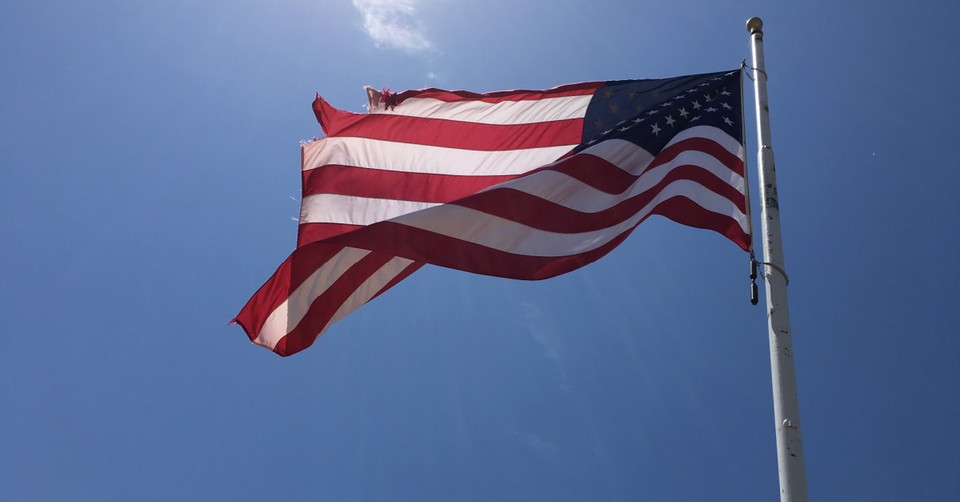Politics, Patriotism, and Making Disciples of Jesus

For the past couple months, I have been teaching a class on Disciples Making Disciples at Grace. I was prepared yesterday morning to teach on the importance of law and gospel in the Christian life, but I decided to make a last minute change to address what I called “Politics, Patriotism, and Making Disciples of Jesus.” I figured in light of Independence Day (prospect) and the Supreme Court ruling on Obamacare (retrospect), it would be timely to address this issue. Needless to say, it was lively, fun, and one of the most engaging hour-long discussions we’ve ever had.
I decided to address this topic not only because of the timeliness of the issue but also the need to have a formative, proactive approach to addressing politics from a gospel-centered framework. No new Christian trusts Christ without a past, without presuppositions or convictions, and this includes politics, culture, and view of God and country. Of the potential things that can drive a person’s identity, politics ranks among the top, so a church committed to disciple-making cannot be ignorant or indifferent in helping new Christians (and old!) understand civil responsibilities and political involvement.
Matthew and Simon: Traitor and Terrorist
Without any formal, prepared thoughts on the matter, I began with Jesus’ selection of disciples. After all, we want to make disciples the way Jesus did. The culture of Second Temple Judaism was as politically charged as ever. The spectrum of political parties was wide and multifaceted, including the Pharisees, Essenes, Zealots, Saducees, and even tax collectors. When Jesus established His kingdom on earth, he entered into this political fray. Who would He choose? What would be their view of Israel? Of the Roman Empire? Of their involvement in culture and government?
Interestingly enough, two of the characters Jesus chose were on complete opposite sides of the political spectrum. Simon was a Zealot – a political party that worked to incite violence and rebellion against the Roman Empire, to expel them from Holy Land by military might. Some have even gone so far as to say that the Zealots were the among the first expressions of terrorism. Anyone who sided with the Roman Empire where therefore enemies and targets of their violent attacks.
And yet, from among them, Jesus chose Simon to be his disciple.
Then there’s Matthew. He’s a tax collector. For those who are not up on the tax collecting business, it’s the job that no Israelite wanted. Signing up for the job made you the most despised and hated person in your community because it was your responsibility to exact taxes from your own people to pay the Roman government. It is widely held that tax collectors abused the tax system, demanding more money and making away with great profit. They were not only unethical cheaters; they were traitors to their homeland and kinsmen. A tax collector may have had money, but that was just about all they had. They were pawns of the Roman government and objects of scorn among their own people.
And yet, from among them, Jesus chose Matthew to be his disciple.
Now imagine with me for a minute what it must have been like to see that Simon the Zealot and Matthew the tax collector are now on the same team! How is that possible? Left to himself, Simon wanted Matthew dead. Left to himself, Matthew demanded Simon to submit to Roman taxation. What were their first conversations like? What was Jesus doing in putting these two together? Did he not factor in their drastic positions? Their strong political affiliations? Their seemingly irreconcilable differences?
We don’t know what happened between Matthew and Simon. In fact, they don’t come across as key players like Peter, James, and John. But the fact that they are included among the original 12 apostles is striking, is it not? Jesus intentionally made disciples of people who, outside his reign and rule, were enemies of one another. He put them together, commissioned them in His name to call people to repentance. By this, Jesus said, the world will know you are my disciples by the love you have for one another (John 13:35). Can you imagine what it must have looked like for Simon to love Matthew, and vice-versa?
Jesus took a terrorist and a traitor and made them His disciples.
Here’s the question I posed to those in my class:
“Can you, a committed Republican disciple a new believer who is a committed Democrat?”
Where I grew up, and the churches I’ve been involved with through the years, this is a critical question. To what degree has politics defined the culture of our churches? Have we allowed our churches to primarily (if not exclusively) be comprised of white, middle-class suburban Republicans? Has our Great Commission focus become marginalized to those who are of a certain political persuasion or fit our personal preferences? Does not an honest look at the makeup of our churches reveal that our disciple-making looks different than that of Jesus?
Here’s my point.
In preaching the gospel, we are to call all men everywhere to repent. Republicans, Democrats, Independents, and everyone in between. From among the masses, God will save some, and we don’t get to pick and choose whom God saves and whom He doesn’t. So what if he chooses to save sinners who happen to all be die-hard Democrats? What if you, being Simon, were provided with a dozen Matthews to disciple? What is the default response?
Well, I’ve exhausted my space for this blogpost, so I will return later. But I’d like to hear your thoughts on this. In the meantime, I will continue to ponder the implications that Jesus put a terrorist and a traitor together and made them world changing ambassadors of His kingdom.
Photo credit: Dori Drabek/Unsplash
Originally published July 02, 2014.







